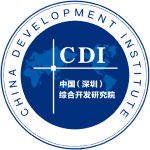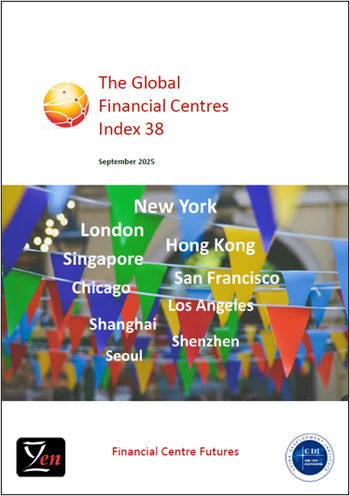Authors
Mike Wardle, Professor Michael Mainelli
Published by
Long Finance & Financial Centre Futures (March 2025), 61 pages. Produced by Z/Yen in partnership with CDI.
Share on social media:


You might also be interested in:
The Global Financial Centres Index 38
The thirty-eighth edition of the Global Financial Centres Index (GFCI 38) was published on 25 September 2025. GFCI 38 provides evaluations of future competitiveness and rankings for 120 financial centres around the world. The GFCI serves as a valuable reference for policy and investment decision-makers.
China Development Institute (CDI) in Shenzhen and Z/Yen Partners in London collaborate in producing the GFCI. The GFCI is updated and published every March and September, and receives considerable attention from the global financial community.
135 financial centres were researched for GFCI 38 of which 120 are in the main index. The GFCI is compiled using 140 instrumental factors. These quantitative measures are provided by third parties including the World Bank, the OECD, and the United Nations.
The instrumental factors are combined with financial centre assessments provided by respondents to the GFCI online questionnaire. GFCI 38 uses 28,549 assessments from 4,877 respondents.
GFCI 38 Results
Leading Centres
- New York leads the index, with London second. Hong Kong retains third position ahead of Singapore.
- San Francisco, Chicago, Los Angeles, Shanghai, Shenzhen, and Seoul are unchanged in fifth to tenth positions.
Western Europe
- London continues to lead in the region, with seven Western European centres featuring in the top 20 in GFCI 38.
- The average rating across this region increased by 0.61%.
- 10 of the 33 centres in the region fell in the ratings in comparison with GFCI 37.
Asia/Pacific
- Six Asia/Pacific centres feature in the world top 15 and the average rating for this region is up 1.27%.
- Just one centre in the region fell in the ratings.
- Labuan entered the index in 60th place.
North America
- New York, San Francisco, Chicago, and Los Angeles remain in the world top 10, with Washington DC and Boston also in the top 20.
- On average, ratings for centres in this region rose 0.56%.
- Four of the 14 centres in the region fell in the ratings. Vancouver fell 11 places in the rankings after its improvement in GFCI 37.
Eastern Europe & Central Asia
- Astana remains in the lead position in the region, with Istanbul and Warsaw improving to take second and third place.
- The average rating change across this region was an increase of 1.36% with 11 centres in the region maintaining or improving their rating.
- Six centres maintained or improved their rank position, while other centres fell in the rankings. Istanbul gained 19 places.
Middle East & Africa
- Dubai and Abu Dhabi continue to take first and second places in the region, with Dubai rising one rank place to 11th in GFCI 38.
- Mauritius takes third place in the region, with Casablanca in fourth place and the leading centre on the African mainland.
- The average rating change across this region was an increase of just 0.22%.
- Tel Aviv, Tehran, and Lagos each fell 10 or more rank places and fell in the ratings, while Cape Town also fell in the ratings.
Latin America & The Caribbean
- Bermuda rose seven rank places to take the lead in the region, ahead of Santiago and Cayman Islands.
- Santiago and Mexico City both rose 14 rank places.
- Average ratings in the index improved by 0.81% in the region, with all centres other than Sao Paulo, Barbados, and Buenos Aires rising in the GFCI ratings.
FinTech
- We are able to assess 116 centres for their FinTech offering.
- Hong Kong takes top position followed by Shenzhen, with New York falling to third place. Singapore has overtaken London to take fourth position.
- Milan, Stockholm, Rome, Calgary, and Bahrain improved by over 20 places in the FinTech rankings. Five centres fell more than 15 places.




